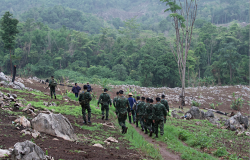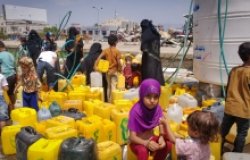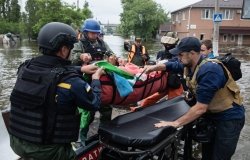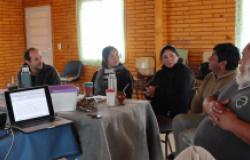Briefing From Ethiopia: Population, Health, Environment Study Tour
MARCH 2007—Grassroot Efforts Promote Alternative Livelihoods, Sustain Environment
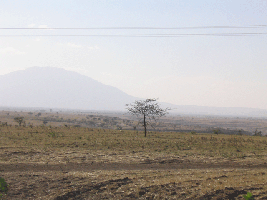 Participants of a study tour of Ethiopia's population-health-environment issues, let by the Packard Foundation in late March, gained first-hand knowledge of the country's unrelenting poverty and insecurity, and the inspiring grassroots efforts to sustain the country's growing population and fragile environment.
Participants of a study tour of Ethiopia's population-health-environment issues, let by the Packard Foundation in late March, gained first-hand knowledge of the country's unrelenting poverty and insecurity, and the inspiring grassroots efforts to sustain the country's growing population and fragile environment.
Traveling through Ethiopia—which currently ranks 170 out of 177 countries on the UN Development Programme's Human Development Index—the participants' abstract understanding of the country's population, environment, and health issues became a reality, writes ECSP Director Geoff Dabelko, who went on the tour:
"Here, I don't need to read between the lines of endless reports to see the country's severe population, health, and environment challenges—they are visible in the protruding ribcages of the cattle and the barren eroding terraces in the nation's rural highlands."
The participants also learned about the country's intersecting environment, population, and security issues. The national parks are a breeding ground for local environmental conflict. Successive governments carved national parks out of once-inhabited land in the mid-1960s and 1970s. Now, people disadvantaged or displaced by the parks often take their revenge on the state by burning buildings, cutting trees, and hunting wildlife. Some have resettled in the parks, bringing cattle and cultivating sorghum.
 The potential for conflict is also on display on the drive through Ethiopia's treeless "forests." Dabelko illuminates the crux of the problem: "While no weapons were evident, I could see that the lack of sustainable livelihoods produces plenty of casualties without a single shot."
The potential for conflict is also on display on the drive through Ethiopia's treeless "forests." Dabelko illuminates the crux of the problem: "While no weapons were evident, I could see that the lack of sustainable livelihoods produces plenty of casualties without a single shot."
Ethiopia's climate may be ripe for conflict, but is not devoid of hope. The study tour included a trip to a small farmers' support group outside Addis Ababa. Receiving some initial technical assistance from the Ethiopian NGO LEM and the Packard Foundation, the 32-member group is undertaking reforestation projects, producing honey as an alternative livelihood strategy, providing health and family planning services, and employing a more sustainable farming strategy. According to Dabelko, "More efforts like these—and better awareness and promotion of them—could help turn deadly environments into safe, sustainable neighborhoods."
Read more about Dabelko's tour of Ethiopia at The New Security Beat blog.
Related Program

Environmental Change and Security Program
The Environmental Change and Security Program (ECSP) explores the connections between environmental change, health, and population dynamics and their links to conflict, human insecurity, and foreign policy. Read more

